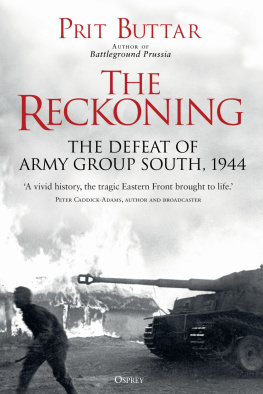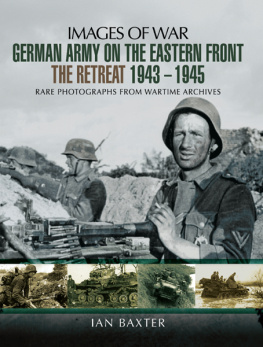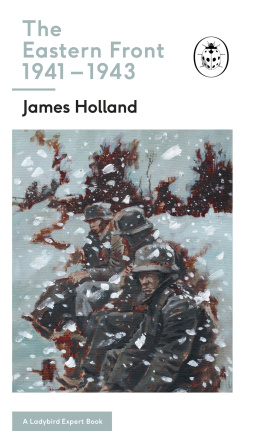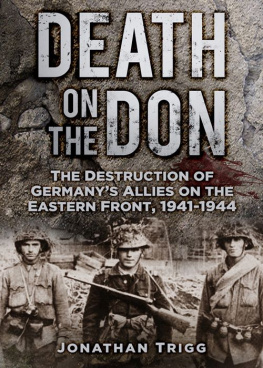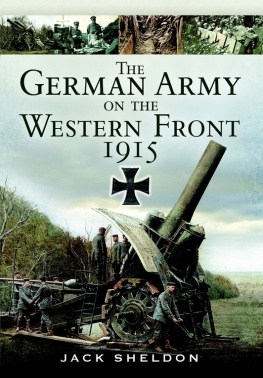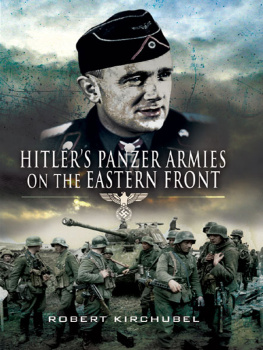Contents
From Defeat to Victory
MODERN WAR STUDIES
Theodore A. Wilson
General Editor
Raymond A. Callahan
Jacob W. Kipp
Allan R. Millett
Carol Reardon
Dennis Showalter
David R. Stone
James H. Willbanks
Series Editors
Decisive and Indecisive Military Operations, Volume 2
From Defeat to Victory
THE EASTERN FRONT,
SUMMER 1944
C. J. Dick
Foreword by David M. Glantz

2016 by the University Press of Kansas
All rights reserved
Published by the University Press of Kansas (Lawrence, Kansas 66045), which was organized by the Kansas Board of Regents and is operated and funded by Emporia State University, Fort Hays State University, Kansas State University, Pittsburg State University, the University of Kansas, and Wichita State University
Library of Congress Cataloging-in-Publication Data
Names: Dick, Charles, author.
Title: From defeat to victory : the Eastern Front, summer 1944 / C. J. Dick ; foreword by David M. Glantz.
Description: Lawrence : University Press of Kansas, [2016] | Series: Modern war studies. Decisive and indecisive military operations ; volume 2 | Includes bibliographical references and index.
Identifiers: LCCN 2016023609
ISBN 9780700622955 (cloth : alk. paper)
ISBN 9780700622962 (ebook)
Subjects: LCSH: World War, 19391945CampaignsEastern Front. | Operational art (Military science)History20th century. | Soviet UnionArmed ForcesHistory . | Military doctrineSoviet UnionHistory.
Classification: LCC D764 .D515 2016 | DDC 940.54/21dc23 LC record available at https://lccn.loc.gov/2016023609.
British Library Cataloguing-in-Publication Data is available.
Printed in the United States of America
10 9 8 7 6 5 4 3 2 1
The paper used in this publication is recycled and contains 30 percent postconsumer waste. It is acid free and meets the minimum requirements of the American National Standard for Permanence of Paper for Printed Library Materials Z39.48-1992.
Contents
Maps and Tables
MAPS
TABLES
Foreword
This is the second volume of C. J. Dicks comparative critique of the differing approaches employed by the Allied powers as they conducted military operations in western and eastern Europe against the Wehrmacht of Hitlers Germany during the summer of 1944. Unlike the first volume, which focuses on how the Western Allies conducted warfare strategically and operationally, this volume analyzes the Soviet approach to land warfare and finds it markedly different and far more effective.
Titled From Defeat to Victory, this volume examines how the Soviet Unions Red Army conducted military operations in eastern Europe from late June through September 1944. Rising from the ashes of embarrassing and costly defeats in 1941 and 1942, the Red Army seized the strategic initiative in late 1942, consolidated its successes in 1943, and embarked on strategic offensives in 1944 that broke the Wehrmachts back and paved the way to total victory in 1945. How, Dick asks, did this transformation occur, and what features marked its success? The answer, he maintains, can be found in the series of major strategic offensives the Red Army conducted during this period. His examination of these offensives, set against the backdrop of doctrinal and institutional changes that took place in the Red Army during 1942 and 1943, provides the hallmarks of this answer. In short, despite the imposing difficulties it faced in the first two years of the war, the Red Army ultimately learned how to wage war at the operational level; this, in turn, generated strategic victory.
Juxtaposed against each other, these two volumes provide a valid basis for comparing the Allied armies differing approaches during the war as a whole. To this end, Dick demonstrates how different historical experiences, not the least involving the type and scale of warfare, led East and West down different conceptual paths. His analysis concludes that the Soviet path was better suited to the nature of the Second World War on land. In short, the Soviets rigor in theoretical analysis, coupled with skillful exploitation of greater and more traumatic and costly experience, led them to evolve superior operational concepts and techniques, as a comparative analysis of methods and results clearly shows.
Setting aside cultural and political differences between the Western Allies and the Soviet Union, Dick argues that the Soviet articulation, acceptance, and practice of operational art distinguished the Red Armys performance in the summer of 1944 from that of the armies of its Western Allies. From the standpoint of military art, this conditioned the Red Armys comparative success.
Looking forward, despite the Wests and, in particular, the US Armys flirtation with the concept of operational art in the 1980s, Dick treats that flirtation as transitory and warns that if Western countries and their leaders fail to acknowledge and understand the importance of the operational level today and in the future, it will be difficult if not impossible for them to wage war successfully. With that conclusion, I find it exceedingly difficult to disagree.
David M. Glantz
Carlisle, PA
Acknowledgments
I found writing this book much more difficult than I had expected when I blithely embarked upon the project. There were many times when I stared glumly at my computer, bereft of ideas, or gazed at the little birds industriously building their nests in my garden fence and wished I too could be out in the sun, indeed, anywhere except at my desk. That the project came to fruition is due in significant part to my beloved wife, Heather. She tolerated my spells of irritability or abstraction, demonstrating extraordinary forbearance in the face of periodic neglect. She encouraged me when I seemed despondent and disinclined to work, offering helpful suggestions to make some passages read more mellifluously. But her finest hour came with the proofreading. Her patience, attention to detail, and constructive ideas have combined to make this study more readable and accurate than it would have been if it had been left to me.
The ideas and opinions contained in this work owe much to my reading but more to innumerable discussions over the course of staff rides and battlefield tours, in the wake of lectures, or over a glass of wine or beer. I cannot begin to list all those who, during thirty or so years of study, made a contribution. I can, however, single out for special thanks the five people who read my drafts, made suggestions, and gave me insights. I worked with and came to know each of them when I was with the Soviet (later, Conflict) Studies Research Centre. All are deeply knowledgeable about military history and, critical for my purposes, about the central theme of my studyoperational art. Four were soldiers who thought deeply about their profession and spent much of their careers, whether during their military service or after, educating officers in staff colleges and through their writings. In Britain, they are Major Generals Mungo Melvin and John Sutherell. In the United States, they are Colonels David Glantz and Les Grau, both soldiers turned academics. My lone civilian, Professor Jake Kipp, has spent a distinguished career in academe, much of it with David and Les, studying and writing about the same themes. I owe David a double debt. He provided me with indispensable material from his unparalleled collection of Soviet articles and General Staff documents.




